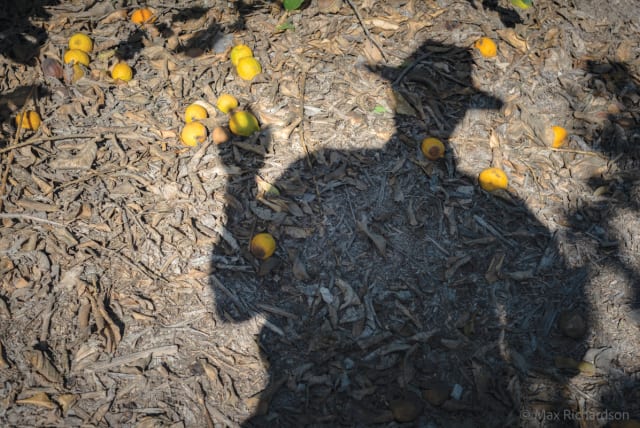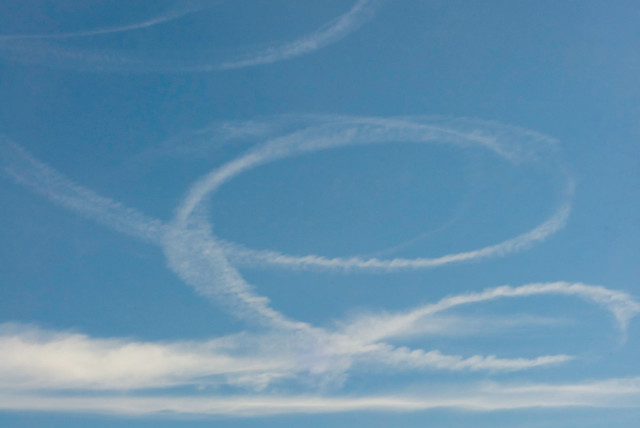Israel's spirit of resilience on display at evacuated farms near Gaza

In the fields near Israel’s border with Gaza, amid the echoes of conflict and the haunting remnants of attacks, there lies a profound resilience.
Descending the holy hills that are Jerusalem, the warm sun sweeps us through Sha’ar Hagai, on to the Shfela [lowlands], and into the heart of Israel’s Coastal Plain. We’ve left our beloved home on a venture that gives us much moral clarity. We’re going to help harvest fruits and vegetables in the evacuated farming communities near Israel’s border with the Gaza Strip. It is the quintessential labor of love.
We were privileged to see the sunrise in the cool quiet of Jerusalem. The sun sparkled through the aging trees, illuminating the ageless stones. In the Shfela, we pass enormous and rolling fruited fields. They are often punctuated with small wet wadis crossing their long arching furrows. At their edges and on their crests are stands of eucalyptus trees fluttering like a million miniature windsocks.
As the sunshine stretches out, burning off the lingering mist, dark blue hills of Central Israel line the horizon over my left shoulder. Mid-morning gives way, and the blue sky remains shrouded. Farther south, the wispy cirrus clouds become one and disappear behind dark plumes of smoke rising from the ground.
The gravity of Israel’s situation, coupled with the enormity of our task, made me think I was seeing a visual depiction of our collective uncertainty. For me, even as a non-combatant, uncertainty is truly the fog of war.
Before I was able to internalize my thoughts, I suddenly noticed a sign in the sky. It looked like a giant pair of pince-nez spectacles looking down on us all. None of us had ever seen it before, but we all knew it was the Israel Air Force. As I photographed it from a speeding car window, a surreal, ominous mood descended on us all.
We pulled into the Yellow gas station for morning coffee and a bun. The place bustled with boots, battle gear, and olive fatigues. There were faces of every origin and description. Men and women, brothers and sisters, parents and children.
A pre-caffeine epiphany must have been spitting seeds when I and my fellow fruit pickers realized that this is not only an army. This is the army of the exiles.
While ultimately unwanted by each individual’s nation of origin, they now all wear one uniform. They defend the only home a Jew will ever know. In Israel, we have a people’s army. We all know that all our children are the soldiers of the Israel Defense Forces.
We packed ourselves back into the car and headed for Kibbutz Shuva. I had many questions about where we were in relation to where the terrorist incursions had taken place. It was not long after the war had begun. I felt that I needed to see where our precious ones were slain.
The highway we were on looked a lot like the highway that led to the Nova festival grounds. Someone mentioned that the hundreds of destroyed cars that had been lined up to bring revelers to the festival were now in a large field near our location.
It hadn’t been possible to sufficiently remove the remnants of human remains from all the cars. The original thought was to bury all the automobiles. However, the IDF has a special unit, which it deployed, for the somber task of making a final cleaning and collection and burying of any remains.
Reliving the horror of the October 7 massacre
When we arrived at the site of the horribly mangled and burnt automobiles, a verse from the Torah was repeating itself in my mind. “Don’t come near, remove the sandals from your feet, for the ground on which you stand is holy” (Exodus 3:5).
I took several photographs until even my gaze seemed to me to be inappropriate.
Still, I was somehow comforted by attempting to engage the subject of my horror and experiencing the disgust I felt by seeing real evidence of the atrocities visited on Israel on October 7, 2023.
For me, the horrible injustices were simply a repeat of the attacks on the Jewish people in every period of history.
Jews identify this enemy of mankind as Amalek. These are the eternal psychopaths who forever attempt to inflict genocide on the eternal people. We are told to erase their name forever. But not to forget what they did to us, even as we were most vulnerable as a people, homeless and wandering.
It is told that Amalek would attack our weak and the ones on the fringes of our society. Our sages relate that they were incredibly cruel. They derided us with an insane hatred. They would cut off the circumcision of a victim and throw it to the sky, mocking the covenant between the Jewish people and our unseen God.
No matter what one’s religious leanings are or are not, civilized people of all persuasions can recognize inhumane behavior and speak out against it.
The savage slaughter of our innocents would be plenty to justify our lawful response. However, our people’s destruction has a much wider and deeper affect.
In the Torah, it was the Jew, Joseph, who figured out a system to save a starving world from the natural disaster of a prolonged international famine.
We are a nation that shares our technology and experience with those in need around the globe. As a matter of principle, we retain this attribute of taking the initiative, as related in our Torah. It was exhibited in our founding family and our namesake. The Torah says “Judah stepped forward” responding to an unfair accusation leveled at his brother.
It was the Jew Judah who volunteered his own life to save that of his family.
The physical activity of picking the oranges or clearing away hundreds of large tomato plants that hadn’t been harvested had the desired affect. For a few hours, I had engaged in the “war effort.”
The drive home to Jerusalem was in a different light; my focus was different. My mood was one of introspection, and I wondered how we would absorb all the loss. The waste that is the cost, the sacrifice so great. In war, no one really wins. The world needs Israel more than it needs terrorism.
In the fields near Israel’s border with Gaza, amid the echoes of conflict and the haunting remnants of attacks, there lies a profound resilience. As we harvest fruits and reflect on ancient scriptures, Israel’s spirit of compassion endures. Just as Joseph and Judah selflessly aided others in hardship, Israel’s commitment to global aid stands unwavering, a beacon of humanity in the face of adversity. This journey isn’t merely about harvesting; it’s a testament to a nation’s enduring spirit, steadfast against injustice, and dedicated to championing compassion worldwide.
I walked alone through the citrus orchards. The harvest hadn’t been picked, pulled, or packed. Everywhere, there was fallen fruit. ■
Max Richardson is a photographer living in Jerusalem. PhotoMax Richardson
Jerusalem Post Store
`; document.getElementById("linkPremium").innerHTML = cont; var divWithLink = document.getElementById("premium-link"); if (divWithLink !== null && divWithLink !== 'undefined') { divWithLink.style.border = "solid 1px #cb0f3e"; divWithLink.style.textAlign = "center"; divWithLink.style.marginBottom = "15px"; divWithLink.style.marginTop = "15px"; divWithLink.style.width = "100%"; divWithLink.style.backgroundColor = "#122952"; divWithLink.style.color = "#ffffff"; divWithLink.style.lineHeight = "1.5"; } } (function (v, i) { });

